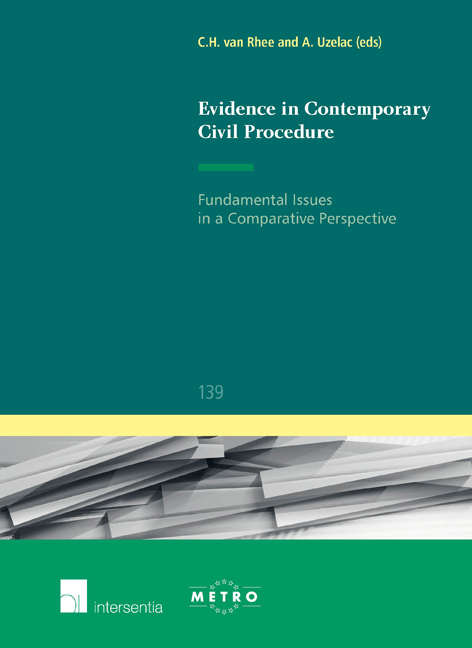Book contents
- Frontmatter
- Contents
- List of Authors
- Acknowledgements
- INTRODUCTION
- FUNDAMENTAL AND OTHER PRINCIPLES OF EVIDENCE IN CIVIL LITIGATION
- TYPES OF EVIDENCE IN CIVIL LITIGATION
- EVIDENCE IN ARBITRATION AND NATIONAL CIVIL LITIGATION
- EVIDENCE: LEARNING FROM ARBITRATION
- EVIDENCE IN CIVIL PROCEDURE IN THE NETHERLANDS: TRADITION AND MODERNITY
- TAKING OF EVIDENCE IN CROATIAN APPELLATE COURTS: WHY NO FACT-FINDING AT SECOND INSTANCE?
- EVOLUTION OF THE POWERS OF THE JUDGE AND THE POWERS OF THE PARTIES REGARDING THE TAKING OF EVIDENCE IN SOUTH AFRICA
- REGISTRAR
- EVIDENCE IN CROSS BORDER CIVIL LITIGATION
- IUS COMMUNE EUROPAEUM
EVIDENCE IN CIVIL PROCEDURE IN THE NETHERLANDS: TRADITION AND MODERNITY
from EVIDENCE IN ARBITRATION AND NATIONAL CIVIL LITIGATION
Published online by Cambridge University Press: 15 December 2017
- Frontmatter
- Contents
- List of Authors
- Acknowledgements
- INTRODUCTION
- FUNDAMENTAL AND OTHER PRINCIPLES OF EVIDENCE IN CIVIL LITIGATION
- TYPES OF EVIDENCE IN CIVIL LITIGATION
- EVIDENCE IN ARBITRATION AND NATIONAL CIVIL LITIGATION
- EVIDENCE: LEARNING FROM ARBITRATION
- EVIDENCE IN CIVIL PROCEDURE IN THE NETHERLANDS: TRADITION AND MODERNITY
- TAKING OF EVIDENCE IN CROATIAN APPELLATE COURTS: WHY NO FACT-FINDING AT SECOND INSTANCE?
- EVOLUTION OF THE POWERS OF THE JUDGE AND THE POWERS OF THE PARTIES REGARDING THE TAKING OF EVIDENCE IN SOUTH AFRICA
- REGISTRAR
- EVIDENCE IN CROSS BORDER CIVIL LITIGATION
- IUS COMMUNE EUROPAEUM
Summary
In order to fully understand the law of evidence in any procedural system, one needs to have knowledge of the wider procedural context in which it is used. Therefore, this contribution on evidence in Dutch civil procedure will start by providing some basic details of the Dutch procedural system.2 The discussion will be limited to civil matters, since evidence law in the Netherlands is not generic for all types of litigation. A specific law of evidence for civil matters exists and since 1988 it can be found (for the largest part) in the Code of Civil Procedure. It will appear that the Dutch law of evidence in civil matters is still (to a certain extent at least) based on traditions, often derived from its French 19th century model, but that especially since 1988 important innovations have been introduced which have resulted in rules that – when considered within the wider procedural framework – have prepared Dutch civil evidence law well for some of the challenges of the 21th century.
In this contribution I will mainly concentrate on the procedure initiated by writ of summons (contentious litigation). The other type of civil action, i.e. the procedure started by way of a petition (originally only for non-contentious matters, especially family matters) will be addressed incidentally. In the future, the differences between the two types of procedure will remain even though it is the intention of the Dutch Legislature to introduce a single document for bringing a civil court action. The single introductory document is not aimed at removing procedural differences, but is mainly introduced for reasons of simplification and digitalisation of litigation.
Like so many other jurisdictions in Europe, the Netherlands has embraced the concept of judicial case management in civil matters (especially since the reforms of the Code of Civil Procedure in 2002). This means that the traditional Dutch principle of the ‘passivity of the judge’ (in Dutch: lijdelijkheid) in civil matters has faded away to a considerable extent. The case management powers of the modern Dutch judge concern in the first place procedural issues, but they may to a certain extent also concern the merits of the case.
- Type
- Chapter
- Information
- Evidence in Contemporary Civil ProcedureFundamental Issues in a Comparative Perspective, pp. 257 - 290Publisher: IntersentiaPrint publication year: 2015



